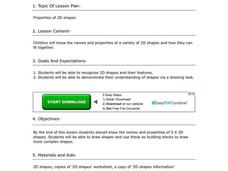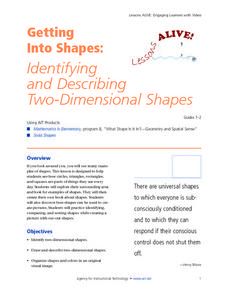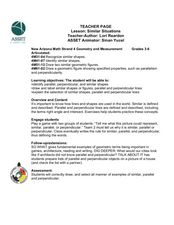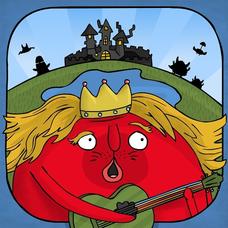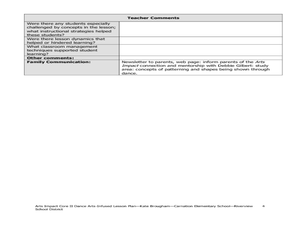Curated OER
Mining Shapes
In this 2-D shapes lesson, kindergarteners review plane shapes attributes. They engage in a shape hunt in the classroom and create art using plane shapes. A good, hands-on lesson!
Curated OER
Properties of 2D Shapes
Second graders determine how to name two-dimensional shapes by their properties. In this two-dimensional figure lesson, 2nd graders work in two groups. They work with the teacher to examine two-dimensional shapes and complete a...
Mathed Up!
2D and 3D Shapes
What a great assessment to give young mathematicians in order to test their knowledge on two- and three-dimensional shapes. Learners name various shapes, identify the number of edges, faces, and vertices, match an unfolded version of a...
Curated OER
Branding Circles, Squares, Rectangles, Triangles
Compare and classify 2-D shapes! Kindergarteners inspect the attributes of plane shapes and examine shapes in everyday life. They label the circles, squares, rectangles, and triangles they find. This is the website where you can find the...
Curated OER
2-D and 3-D Presents at Pedro's Party
Fifth graders draw 2-D and 3-D shapes. They sketch and label geometric figures with correct terminology, then explore parallel and perpendicular lines. Pupils sort and classify shapes drawn.
MENSA Education & Research Foundation
Shapes - Kindergarten
Extend scholars' learning experience with a unit consisting of five shape lesson plans, an extension activity, assessment, and rubric. Begin by reading a story about shapes, then conduct an overview and assign pupils' their first...
World Wildlife Fund
Arctic Shapes
In a two-part worksheet, young geometers examine 3-D shapes and describe their attributes in a table. They will be able to draw the shape and name the number of vertices, faces, and edges. In the second part, individuals explore...
Curated OER
Attributes of Polygons: Stretchy Shapes
Fourth graders use dancing methodology in a polygon and shape activity. For this shape and dance lesson, 4th graders discuss shapes in dance, math, and everyday life. Students use dancing activities to recognize and analyze shapes.
Curated OER
Shapes in Our World
Help your students explore shapes. They classify shapes and identify them in their everyday world. Plane shapes are explored, and they classify and identify the plane shapes.
Curated OER
Getting Into Shapes: Identifying and Describing Two-Dimensional Shapes
Young scholars examine their classroom to find examples of various types of shapes. After identifying and describing the various shapes, they draw as many as they can on a piece of paper. They organize them into an image based on their...
Curated OER
2: Isle of Shapes - Based on the Puerto Rico Quarter Reverse
Learners identify both two and three-dimensional shapes. In this geometric shapes instructional activity, students listen to a teacher led instructional activity about the island of Puerto Rico. They look at the symbols and shapes on...
Curated OER
Parallel and Perpendicular Lines
Learners study parallel and perpendicular lines. For this parallel and perpendicular lesson, pupils explore 2-D shapes and determine if the sides are parallel or perpendicular.
Curated OER
Similar Situations
Students explore intersecting lines. In this intersecting lines lesson, students investigate shapes consisting of parallel, perpendicular, and similar lines. Students investigate these lines in shapes around them.
Centre for Innovation in Mamatics Teaching
Area, Perimeter and Volume
Develop young mathematicians' knowledge of two- and three-dimensional shapes with this geometry workbook. From learning about the classifications of different shapes and figures to calculating their area, perimeter, and volume, this...
Arizona State University
Roundup Shapes
Let's study 2-D shapes! Young mathematicians compare and classify shapes according to attributes. They evaluate shape riddles and predict the shape being described. Here is the website where you can find the...
Curated OER
2-D Shape Patten Placemats
Students identify and form a pattern out of 2-D shapes, then transfer this pattern into creating placemats.
Curated OER
Congruent Polygons: Copying Stretchy Shapes
Third graders investigate congruent polygons through dance. In this congruency lesson plan, 3rd graders do the "brain dance" as a warm up. They review polygon names by singing "The Polygon Chant," before mirroring congruent shapes with a...
iMagine Machine
The Land of Venn - Geometric Defense
Young mathematicians use their geometry skills to save the Land of Venn in an engaging math game. A fun way to reinforce children's understanding of basic geometric figures and shapes.
Curated OER
Circles 1, 2, 3, 4
Here is a way to help your charges identify circles and spheres. In this shapes geometry and technology lesson plan, students identify and draw circles and explain the related attributes. They recognize circles and spheres while...
Curated OER
Basic Right Triangles
Elementary schoolers examine the attributes of triangles. In this triangle lesson, learners compare regular triangles and right triangles. They explore vertices and angles and investigate obtuse and acute angles. Pupils draw multiple...
Curated OER
Dancing Polygons and Non-Polygons with Patterns
Second graders study movements. In this dance lesson, 2nd graders draw patterns selecting one to represent through movement with their body.
Pennsylvania Department of Education
Shapes Around Us
Learners use manipulatives to study shapes. They sort shapes and use correct geometric terminology to describe them. Students find real-life examples of 2 and 3 dimensional shapes, and classify figures in their classroom according to...
Arizona Department of Education
Area and Perimeter of Regular and Irregular Polygons
Extend young mathematicians' understanding of area with a geometry lesson on trapezoids. Building on their prior knowledge of rectangles and triangles, students learn how to calculate the area of trapezoids and other...
Alabama Learning Exchange
Polygons-Changing Area Versus Changing Perimeter
Investigate the area and perimeter of polygons in this geometry lesson. Young geometers use grid paper to draw a quadrilateral and calculate its area and perimeter. They also read The Greedy Triangle to identify the changing shape of...

